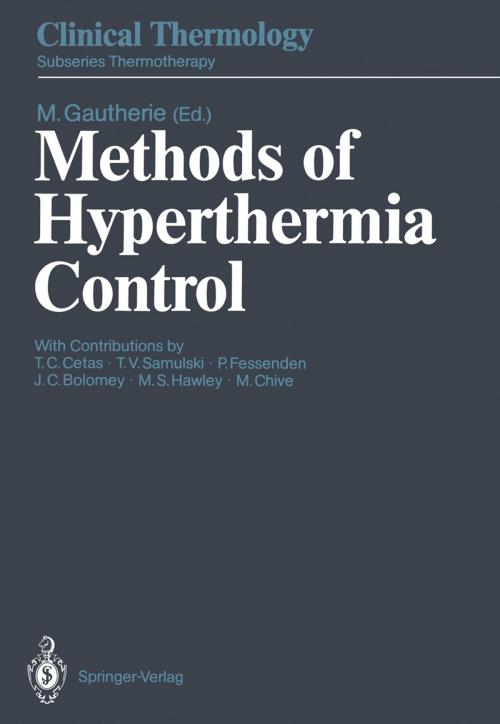Methods of Hyperthermia Control
Nonfiction, Health & Well Being, Medical, Medical Science, Biochemistry, Specialties, Oncology| Author: | Maurice Chive, Jean C. Bolomey, T.C. Cetas, Peter Fessenden, Thaddeus V. Samulski, M.S. Hawley | ISBN: | 9783642746369 |
| Publisher: | Springer Berlin Heidelberg | Publication: | December 6, 2012 |
| Imprint: | Springer | Language: | English |
| Author: | Maurice Chive, Jean C. Bolomey, T.C. Cetas, Peter Fessenden, Thaddeus V. Samulski, M.S. Hawley |
| ISBN: | 9783642746369 |
| Publisher: | Springer Berlin Heidelberg |
| Publication: | December 6, 2012 |
| Imprint: | Springer |
| Language: | English |
The enormous potential that hyperthermia has for benefiting patients with cancer is impressively indicated by biological studies, both in vitro and in vivo, and by comparative clinical studies whenever the heat has been appro priate to the size of the tumor. But hyperthermia, as with any other technologically based medical procedures, requires an extensive develop ment of sophisticated instrumentation and techniques to offer routine clinical benefit. We probably erred in starting clinical trials so soon. We had hoped that by showing the clinical benefits on some superficial tumors quickly, financial support would be stimulated for the required technolog ical developments. Unfortunately, treating superficial disease adequately was more difficult than we had supposed and regional treatments were less successful than we had wished. The physical reasons are clear and were apparent from the beginning, although in our enthusiasm we ignored them. Circumstances are different now. We have to treat a wide range of tumors in various sites, but the systems and techniques required are only available in a few laboratories and clinics where they still are undergoing refinement.
The enormous potential that hyperthermia has for benefiting patients with cancer is impressively indicated by biological studies, both in vitro and in vivo, and by comparative clinical studies whenever the heat has been appro priate to the size of the tumor. But hyperthermia, as with any other technologically based medical procedures, requires an extensive develop ment of sophisticated instrumentation and techniques to offer routine clinical benefit. We probably erred in starting clinical trials so soon. We had hoped that by showing the clinical benefits on some superficial tumors quickly, financial support would be stimulated for the required technolog ical developments. Unfortunately, treating superficial disease adequately was more difficult than we had supposed and regional treatments were less successful than we had wished. The physical reasons are clear and were apparent from the beginning, although in our enthusiasm we ignored them. Circumstances are different now. We have to treat a wide range of tumors in various sites, but the systems and techniques required are only available in a few laboratories and clinics where they still are undergoing refinement.















